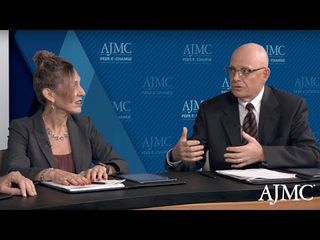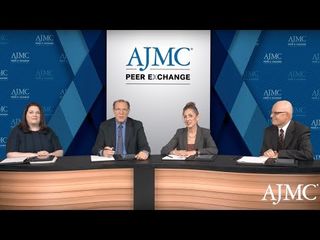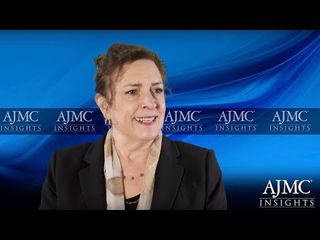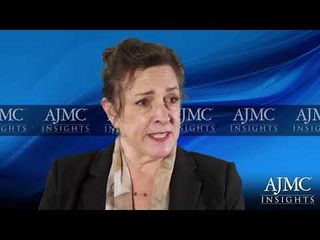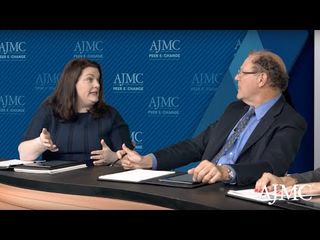
Clinical
Latest News
Latest Videos

More News

Combining positron emission tomography and computed tomography early in the treatment plan for patients diagnosed with advanced melanoma can help identify the potential benefit of a specific immunotherapy and avoid the risk of non-beneficial intervention.

John Eikelboom, MD, of McMaster University discusses the 3 arms of the COMPASS trial and explains the need for it to end earlier than anticipated.

A new extended release oral suspension for the treatment of attention-deficit/hyperactivity disorder in patients 6 or older was approved by the FDA and would provide an option for patients seeking a liquid treatment instead of a pill or capsule. Michael Feld, MD, a child, adolescent, and adult psychiatrist in the Chicago area specializing in the treatment of ADHD, explained what the benefits of Adzenys ER from Neos Therapeutics are for both patients and physicians.

Advancements in the cancer immunotherapy pipeline are leading to the production of immune checkpoint inhibitors, and a recent report from Global Business Intelligence (GBI) Research titled “Cancer Immunotherapies-First-in-Class Pipeline Dominated by Immunomodulators and PD-1 Like Targets” took a look at the pipeline.

Adults with moderate-to-severe atopic dermatitis who were treated with Dupixent (dupilumab) from Sanofi and Regeneron along with topical corticosteroids experienced improvements in overall disease severity, according to results from phase 3 of the CAFÉ trial.


Researchers at the London School of Economics and Political Science have developed a multiple criteria decision analysis model, The Advance Value Framework, that payers can utilize for evaluating new medicines that come to the market.

The increasing trend in long-term prescription opioid use in the United States calls for further research on the potential benefits and harm, according to a study.

A new paper in JCO Precision Oncology evaluated the impact of the support provided by a decision support team on clinical decision making and trial enrollment.

Physicians across different institutes who have been involved in clinical trials of chimeric antigen receptor (CAR) T cells in B-cell lymphomas have developed a guideline for monitoring and managing the symptoms associated with this treatment.

People age 50 and older should now receive the shingles vaccine, according to a new recommendation by the American Academy of Ophthalmology and the American Dermatological Association, which lowers the recommended age by 10 years.

Leslie Citrome, MD, MPH, of New York Medical College, discusses payer coverage of atypical antipsychotics with fewer metabolic side effects.
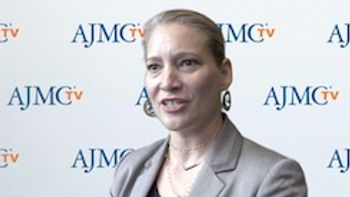
There is a stigma that comes with being addicted to opioids, even if they are prescribed to manage pain, that can hurt the care patients need to receive, said Arwen Podesta, MD, ABPN, FASAM, ABIHM, of Tulane University.

Payers have made tremendous progress in improving oversight of opioids and other pain medications, but what is really needed is a shift to abuse-deterrent formulations, which are more expensive, said Thomas Kosten, MD, a psychiatrist with Baylor College of Medicine.

Right now, state policy regarding medical marijuana use is out ahead of the science, which can lead to predicaments where cannabis is prescribed in situations where it is not needed, explained Kevin P. Hill, MD, MHS, of Beth Israel Deaconess Medical Center and Harvard Medical School.

Cabazitaxel can now be used at a dose of 20 mg/m2 every 3 weeks in combination with prednisone in patients with metastatic castration-resistant prostate cancer who have received a docetaxel-based treatment regimen.

John Eikelboom, MD, of McMaster University discusses the 3 outcomes of the COMPASS trial that address the main concerns of patients.

The FDA has approved bevacizumab-awwb (Mvasi) as a treatment for multiple cancers. The drug has been approved as a biosimilar to its reference biologic, bevacizumab (Avastin), but it has not been approved as an interchangeable product.

Psoriasis has a significant presence, affecting about 125 million people globally, but current estimates are fragmented because of a lack of a global standard. A new report suggested that global data will need a standardized approach of collection and analysis in order for more accurate estimates of psoriasis’ presence.

The majority of patients with pulmonary arterial hypertension, except for a few special circumstances, will begin treatment on combination therapy, instead of monotherapy, because combination therapy has been shown in trials to ahve better outcomes, explained Simon Gibbs, MD, Reader in Pulmonary Hypertension at the National Heart and Lung Institute, Imperial College London.


The use of statin drugs in patients with chronic obstructive pulmonary disease is associated with benefits including decreased lung-related and all-cause mortality, according to a research.

Recent advances in brain imaging have improved understanding of acute and chronic pain, but have led to an increased in the demand to use this data for insurance and medical legal cases. However, a task force is advising against the use of brain imaging as a “lie detector” test for chronic pain.


CheckMate-214 results presented at the European Society of Medical Oncology meeting show improved overall survival in patients with renal cell carcinoma treated with the nivolumab-ipilimumab combination, compared with sunitinib.



